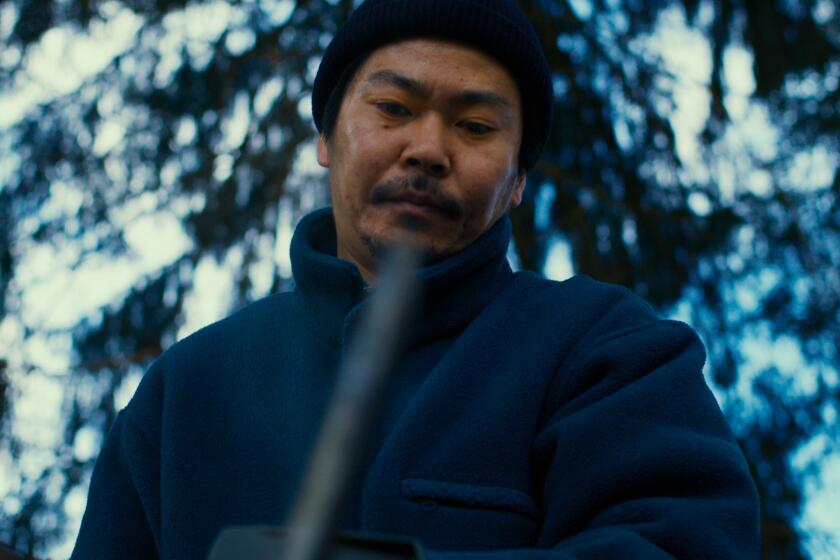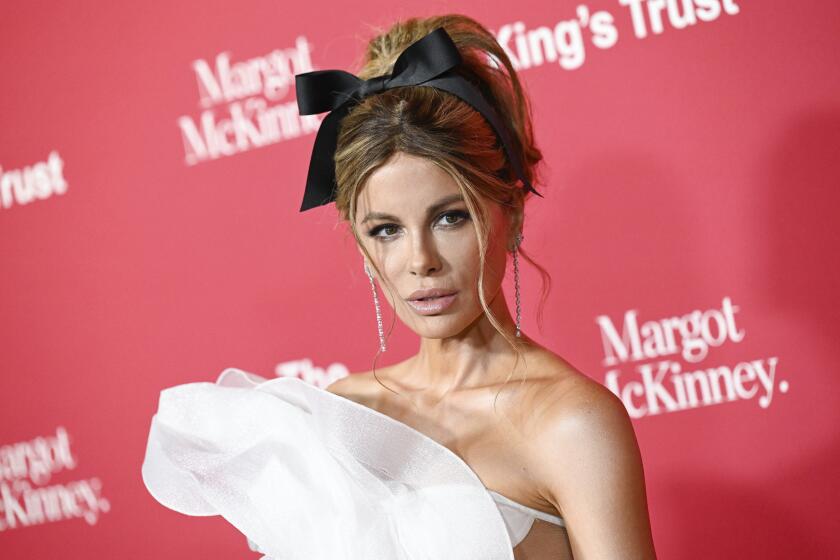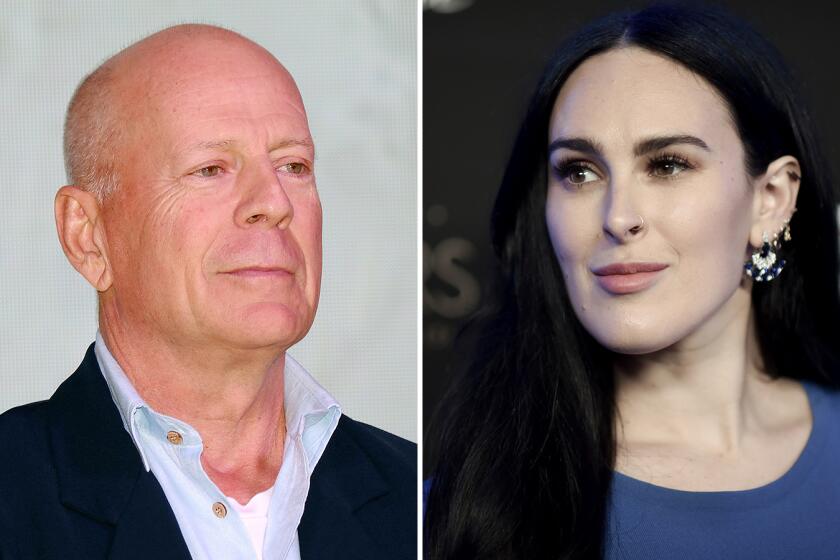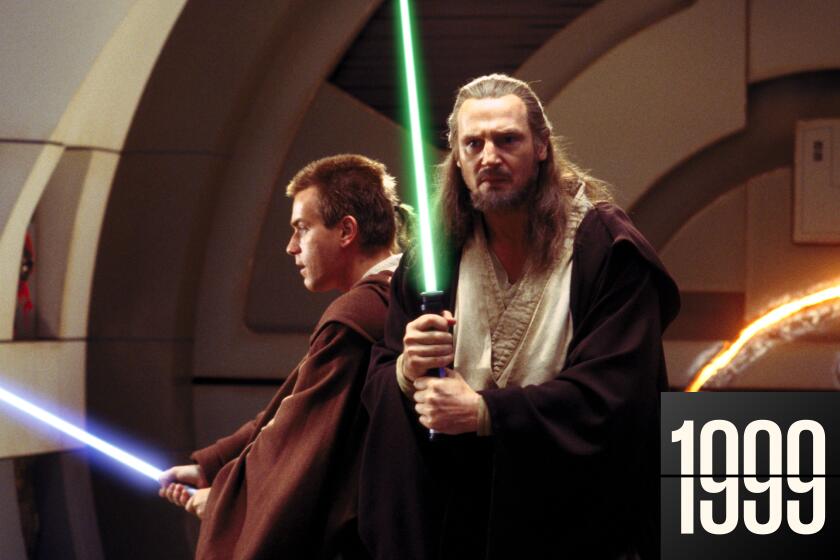Hoffman vs. Hoffman
The subject is acting. Dustin Hoffman sits on his sofa, half reclines really, his head resting on the heel of his right hand. He is speaking softly, slowly, of his life and times--specifically this moment of disagreements he had with director Sam Peckinpah over their 1971 movie “Straw Dogs.”
Virulently misogynistic--the movie depicts Susan George enjoying getting raped--”Straw Dogs” remains one of the great, troubling films of its time, a Vietnam War-era statement about violence and the nature of man. But, 28 years later, Hoffman still is disappointed that the movie failed to touch upon what he saw as the hypocrisy of Vietnam-era pacifists. As he discusses this, his frustration at failing to reshape the movie’s theme, he leans in to make a startling, if offhand, admission: “I don’t really want to be what I am, meaning an actor,” he says. “My first choice would be to be the author.
“And the actor,” he adds, “is not the author.”
It makes perfect sense when he says it. It explains everything, the legendary clashes with collaborators, the meticulous research he conducts for his roles, his perhaps overreaching ambition to mold the films in which he appears.
This is Hoffman’s curse: By anyone’s reckoning he is one of the country’s two or three most accomplished actors, arguably the most influential male presence in American cinema since Marlon Brando. But this doesn’t mean he is content.
Speak with him very long about acting and the conversation veers into discussions of painting, music and writing--the creative arts that he would find so much more satisfying if only he did them as well as he acts.
“I can’t help being this way,” he says. “I have stuff in notebooks going back years, and all those notebooks are meant to be full. They all have just a few pages in them,” he says. Then he laughs. “I think it’s always the notebook. It’s not the right notebook. So I’ll go back to the stationery store--I gotta get the right notebook and then I’ll really fill it.
“I’d still like to be a writer,” he says. “I still am trying to be that every morning when I get up, and maybe someday I’ll break through.” It is surprising to hear Hoffman, at 61 and on the eve of receiving the American Film Institute’s Life Achievement Award on Thursday, speak with the hunger of a young man still trying to make his mark. In our conversation, he reflects on his career with obvious pride, but mostly he talks with regret for the compromises he’s made, the goals he has not reached.
“You’re always looking for something that ultimately you probably know is beyond your reach,” he says. “Einstein is supposed to have said in an interview just before he died something to the effect that ‘all my life I was trying for something more than the unified theory. I was trying to prove the existence of God mathematically, and I’m very close to proving it.’ ” Hoffman flashes a brief, mirthless smile. “He was going for bigger fish.”
The Life Achievement Award inevitably has caused Hoffman to think about age and finality. More than once he says, “If I could do it over again,” and more than once during four hours of conversation he ponders how his swift movie success may have taken him too far, too fast from the things that led him into acting in the first place.
“They say power corrupts,” he says. “Well, success . . .”
He breaks off. His 17-year-old son, a young actor who’s about to start film school and who had sat in on part of the conversation, is about to head out the door to an audition. Jake is the embodiment of fresh-faced innocence, the future bright before him.
“Good luck, Jacob,” Hoffman calls out. “How do you feel?” It is the same question his character asks in “Kramer vs. Kramer” when he is teaching his young son to ride a bicycle. It is just before he lets go of the bike and giddily watches his son glide alone down the path away536870912from him. “How does it feel?”
“I feel good,” Jacob says, and he is gone.
*
He gives the credit to Mike Nichols, but the chief importance of Hoffman’s rise to stardom in 1967 with “The Graduate” was that it paved the way for the legion of actors who followed him who weren’t tall or blond or beautiful. In the ‘50s Brando had opened the door to a new naturalistic style of acting. In the ‘60s Nichols and Hoffman took it one step further. Now leading men could be natural-looking. And they no longer had to downplay their ethnicity.
Before “The Graduate,” Al Pacino would not have been considered leading man material, and neither would Gene Hackman, Robert Duvall, James Woods, Ben Stiller or any number of others. “My opinion is that Dustin Hoffman changed the way actors were perceived and what they were allowed to do,” says Tom Pollock, the AFI’s chairman. “He was not an obvious leading man, yet he’s been an exceptional one.”
In the book on which “The Graduate” was based, Benjamin Braddock, the confused college graduate who must negotiate in a world of changing values, was a New England WASP. Nichols turned the characters into Beverly Hills Jews and then cast as the romantic lead a young Los Angeles-born New York stage actor with the kind of looks that previously would’ve condemned him to supporting parts.
Hoffman and his friend Hackman had moved to New York in the 1950s to escape the Hollywood sensibility that he says had permeated even a theatrical training school like the Pasadena Playhouse, where they both studied. He’d learned to not even try out for a film’s romantic lead.
“You believe what people say to you,” he says. “I guess that’s what discrimination at its root is all about. You begin to believe what’s said if it’s said enough times, and you keep going into casting offices and they keep telling you that you’re not good-looking, that you’re, to put it kindly, a ‘character juvenile.’ That means you’re not the lead. That means you’re the funny-looking sidekick. That was the terminology then.”
In New York, he and Hackman became friends and roommates with Duvall. Through the two of them, Hoffman met a young theatrical director named Ulu Grosbard, who was running a play workshop. Hoffman became his assistant.
Hackman and Duvall’s great talent was evident even then, Grosbard says, but Hoffman at the time was “just an actor I met through some friends of mine.” Though they worked together on several stage productions, with Hoffman sometimes acting as stage manager--”He really ran things when I went on to work on other stuff,” Grosbard remembers--the director never saw Hoffman act until years later.
(Eventually, Grosbard would step in to direct the 1978 movie “Straight Time,” which was to be Hoffman’s directorial debut, when the actor decided he could not star, produce and direct all at the same time. The clashes over control of that picture dealt an end to their friendship, and it was the beginning of Hoffman’s reputation in Hollywood as “difficult.” Grosbard later criticized Hoffman in print. Now, with the passage of time, Grosbard says the two are friendly again. “But it’s not like it was,” he says.)
*
Hoffman studied piano as a youth, and he still loves music. Behind him in the airy den of his home is a cello that sits next to a piano. A computer is attached to the piano, turning it into a modern-day version of a player piano. Hoffman pops in a disc and demonstrates how it works by playing cello along with jazz great Bill Evans.
As an actor, the first time he experienced what he imagines it would be like to be a composer, painter or writer was when he worked on “Kramer vs. Kramer” with director Robert Benton and co-star Meryl Streep. He and his first wife were going through a divorce when he made that movie, which was about a newly single man who learns to care for his son and the legal fight with his ex-wife over custody.
“I remember saying to Dustin, this is a film about our lives, our families,” Benton says. “It’s so close to playing yourself that you may not want to do it.”
Hoffman loved it. “It was the first film I ever made that was about something I was going through at the same time,” he says. “I thought, ‘Hey, this must be what it’s like to be an artist. You get up in the morning and you paint what’s going on.’ Or it’s what you do when you’re writing. Or at least that’s my fantasy.”
Benton, Hoffman and producer Stanley Jaffe worked closely on the script for months. Streep and Hoffman contributed the dialogue for some of their own most powerful scenes, but because Hoffman was in almost every scene, he helped shape the entire script. The only other experience he can compare it to is the making of “Tootsie,” which he also helped conceive and write. But while Benton describes the “Kramer” experience as “a wonderful, wonderful time,” Hoffman clashed with Sydney Pollack, who directed “Tootsie,” over control of that movie.
Being an actor, he says, ordinarily is like looking through a camera lens and seeing a double image. You try to adjust it to make it one image. “An actor gets a script that someone else has written, and you try to fuse yourself into the sensibility of the author,” he says. “As an actor you’re trying to get one with the author, and sometimes the only way to do that is to somehow make it your own, as they say. But you make it your own with the same intent that the author had.
“So I guess that’s what’s behind it,” he says of his constant struggle to shape his movies. “If I had been an author, I would’ve been dealing more with how those years and what was going on around me were affecting me in a more autobiographical way. I guess that’s my natural bent.”
Brando, after revolutionizing screen acting in the ‘50s, grew bored eventually; he took to disparaging the profession and lapsed into carelessness in his work. Hoffman remains as committed as ever. Yes, he wants to be the author of his movies, but that doesn’t mean he finds acting insignificant. It means merely that he wants the words and ideas he expresses to be his own. The case can already be made for Hoffman as an auteur. Perhaps not in the same sense as Woody Allen or Warren Beatty or Clint Eastwood, actors who also direct and whose work undeniably is infused with their worldview. And certainly not in the way that John Wayne or Humphrey Bogart could be regarded as auteurs--these were actors with personas so powerful that any movie they appeared in had to be shaped to accommodate them.
Hoffman, as Pollock notes, has no single persona he carries from film to film. Even though it is of the utmost importance to him that he make each role personal, that he finds aspects of himself in the character, such is his acting skill that he seems to become the character.
Still, in looking at Hoffman’s career, it is possible to discern his work. The recurring themes in movies, like the man, are engaged with the world. He has a wide-ranging curiosity and makes constant references to information he has gleaned from newspapers, television and from books. Just as he grounds his characterizations in reality through the careful accumulation of physical detail, the subject matter of many of his films relates directly to what is going on around him.
For one thing, he has done four films that deal with the power of the media and the ways it can be manipulated and used for good or ill--”All the President’s Men,” “Hero,” “Mad City” and “Wag the Dog.”
He has no agenda in choosing his films, he says. But when he accepts a role, he has to be able to relate to the subject matter. It is clear from comments he makes on journalism and the media that he has thought and felt strongly about the subject. It is not lost on him that this string of films begins with journalists portrayed as heroes--”All the President’s Men” sparked a huge rise in journalism school admissions--and ends with a trio of films in which either the media are used to deceive or journalists are gullible or motivated by self-interest.
The subject that has preoccupied him the most, though, and provided him with his most memorable parts, has been gender roles. He probed the issue most directly in the comedy “Tootsie,” in which he portrayed an actor who pretends to be a woman to get work and is transformed by the experience. But the arc of that character’s evolution closely resembles that of his character in “Kramer vs. Kramer.” Both men start out self-absorbed and dismissive of women’s concerns. And by the end of both movies, each has gotten in touch with his feminine side and become a better person because of it.
On the flip side, “Straw Dogs” could be viewed as a meditation on man’s nature and the meaning of masculinity. In the end, the Hoffman character gets in touch with his primal male nature in order to protect his woman and his home.
And “A Walk on the Moon,” a movie Hoffman co-produced that will be released in April, focuses on a woman, like the Streep character in “Kramer,” who feels unfulfilled and stifled in her marriage and who must take steps to become her own person. The female characters describe what they are going through in almost identical language.
Gender issues are much on Hoffman’s mind. The screenplay he’s been trying to write for years and on which he says he’s making progress is an exploration of men’s attitudes toward women--an outgrowth of ideas “Tootsie” inspired.
“I’m more emotionally connected with that movie probably than any part I’ve ever done,” he says of “Tootsie,” which was one of his most popular films and for which he received one of his six Oscar acting nominations. (He won best actor Oscars for “Kramer” and “Rain Man.”)
Like the character in the movie, Hoffman says he was sensitized toward women by the role. Hoffman acknowledges sadly, though, that as much as he would like to change it, he remains the product of his upbringing. “You can’t change who you are,” he says.
It is growing late and Hoffman’s children (four live at home) are starting to come home from school. He chats briefly with Max, his youngest son, who is getting over a cold.
Max, Hoffman says, is growing up without the gender and racial baggage that someone of Hoffman’s generation inevitably picks up. While describing a friend recently at the breakfast table, it never occurred to 11-year-old Max to mention that the boy was African American--Max had never noticed. “I wish I could be like Max,” Hoffman says.
*
Hoffman’s career has not been a constant string of highs. The last 10 years have been dominated by less-than-stellar films, commercial duds and impressive but small roles in movies in which other people star. And in the mix are two movies that one ordinarily would not associate with an actor of Hoffman’s accomplishments.
“Outbreak,” a 1995 movie about a disease epidemic, and “Sphere,” which Hoffman quotes co-star Samuel L. Jackson as describing as “a monster movie without a monster,” are genre films in which Hoffman plays characters better suited to action stars such as Mel Gibson and Harrison Ford.
In fact, those two actors had been sought by director Wolfgang Petersen for “Outbreak” but were unavailable.
To explain why he took the role, Hoffman describes an interview with author David Halberstam that he saw recently on C-SPAN. Halberstam, whose past subjects have included the Vietnam War, the power of the media and the civil rights movement, explained why he wrote a book about Michael Jordan in part by saying, “I’m broadening my constituency.”
Hoffman has the same answer. He says he insisted on playing his character as an ordinary guy, not a superman, and he is disappointed that an ironclad release date would not allow Petersen time to have the script rewritten to remove the more grandly stereotypical elements. The movie was very successful commercially, but, as several critics noted, it becomes a different movie after the first hour.
This is one of the roles Hoffman was referring to when he talked of compromises earlier. In today’s Hollywood, so much emphasis is placed on how much money movies make the opening weekend that the stars in demand are those who can “open” a picture big. He sees this as a major change in the business from when he entered it: Money seems to be the only determinant of a movie’s worth. As much as he has tried to resist choosing movies for financial reasons, he says you can’t help but be seduced by the demands of the business. “I know if I could do it again there are certain pitfalls I could more successfully resist,” he says.
Hoffman agreed to do “Sphere” because the director was Barry Levinson, who had directed him in “Rain Man” (1988), “Sleepers” (1996) and “Wag the Dog” (1997). He and Levinson had worked together beautifully before, Hoffman says, creating multidimensional characters out of roles in the latter two films that were not fully fleshed out on the page. “Barry is the only director I ever met who, when he says we’ll find a way to make it work, he’s been right,” Hoffman says.
This time they couldn’t make it work, but he says he is glad he took the part because he was helping his friend to try something different. Critics, he says, “like it much better if you succeed at something that’s been done 50 times.”
After “The Graduate” became a hit 32 years ago, Hoffman says he didn’t work for a year. He had rejected demands from producers that anyone who took a screen test had to commit to several other as-yet-unnamed films if that actor got the role. Hoffman wouldn’t let anybody tell him what part he had to play.
He remained independent after the movie became a hit, turning down every script that came his way. He decided he’d rather go back to the stage than do movies he did not believe in. When “Midnight Cowboy” came along, he agreed against everyone’s advice to take a supporting role--the kind of role he’d just graduated from--because it was a great character.
“It was not a difficult decision,” he says. “But I think I started to slip after that. I got talked into doing ‘John and Mary’ because I’d just gotten married and my manager said, ‘You want to buy that townhouse?’ ” This was before “Midnight Cowboy” was released and no one knew what a sensation it would become. His manager told him he had to reestablish himself as a romantic lead. “I was opposite Mia Farrow. They put us on the cover of Time magazine. So you get talked into things.
“There are certain things my friends and I never thought about when we started,” Hoffman continues. “We never thought about making it--I’m thinking about Duvall and Hackman. It was out of the question in the traditional sense. Making it meant being able to work as an actor for the rest of your life.
“And then this thing happens and all of a sudden stuff enters,” he says. “You’re a star. Your audience wants this. Money enters the picture. If you want the money, if you want the salary that the biggest stars are getting you’re gonna have to earn it; you have to do certain kinds of work.”
He speaks ruefully of the days, before stardom, when the work was what mattered and he and his friends sometimes gave their best performances to an audience outnumbered by the actors on stage.
“One of the things that happens to you when a roomful of people applauds you,” he says, “is that the importance of five people applauding you is diminished.
“The truth of the matter is I really feel lucky, and I’m happy that I’ve had this extraordinarily rare opportunity to work--because I know most actors can’t get work--and to work with really quality people,” he says. “And knowing all that, I really wish that I could do it again, because if I could do it again I would try to do it in a more courageous way. And since I can’t I would like to at least finish that way.”
More to Read
Only good movies
Get the Indie Focus newsletter, Mark Olsen's weekly guide to the world of cinema.
You may occasionally receive promotional content from the Los Angeles Times.






